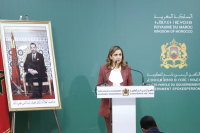
Brief_simple (288)
Nathan Nwachuku (photo), co-founder of Nigerian edtech Klas, announced on Monday, February 5 the successful completion of a $1 million funding round. The funds power up the startup's online schools worldwide.
The Orange Foundation inaugurated its 22nd Digital House in Côte d’Ivoire on Wednesday, January 31, at the Institution de formation et d'éducation des femmes (IFEF) in Soubré. This initiative aims to empower women and promote their digital inclusion by providing access to tailored digital tools and content. Ultimately, it seeks to facilitate their professional integration into the local economy.
"The inauguration of this new Digital House underscores the Orange Côte d'Ivoire Foundation's commitment to supporting women," said Habib Bamba, Director of the Foundation's Management Committee. "We believe that digital technology is an essential tool for their financial autonomy."
U.S. satellite internet company Starlink's application for an operating license in Botswana has been rejected due to incomplete information. "There were issues regarding missing requirements with the application, which were identified and pointed out. [...] They are yet to respond to the issues," a source from the Botswana Communications Authority told Techcabal. Botswana is the third country in southern Africa to oppose the deployment of Elon Musk's company, after Zimbabwe and South Africa.
South African startup offerZen, which connects tech talent with businesses, announced last week it closed a €4 million funding round. The company plans to use the funds to develop its technology platform and expand its service offerings.
Ethiopia's Ministry of Education said last week it distributed 3,790 tablets to 18,000 schools nationwide, aiming to digitize the teaching and learning process. The initiative, in partnership with the World Bank, seeks to equip schools with digital tools and strengthen teachers' digital skills. This follows the distribution of 1,000 tablets to high schools in 2023 for similar purposes, bringing the total to 4,790 devices distributed.
The Seychelles Council of Ministers has approved a new law to regulate virtual assets (VAs) and virtual asset service providers (VASPs), Vice President Ahmed Afif announced. The legislation, awaiting National Assembly approval, aims to foster responsible and sustainable growth in the burgeoning industry.
Ghita Mezzour (photo), the Moroccan Minister for Digital Transition and Administrative Reform, outlined the Maroc Digital 2030 strategy at a Government Council meeting on Thursday, January 25. The strategy is anchored in two main pillars: the digitization of public services and the stimulation of a new dynamic in the digital economy. The goal is to foster the development of Moroccan digital solutions, create added value, and generate jobs, forming the basis for digital development in the country.
Cova, a Nigerian startup offering asset management services, announced its closure in an email to users on Tuesday, January 23. The firm, citing "several factors," will cease operations on February 10, 2024. Cova assured users they would be fully refunded by February 13 at the latest.
Altschool Africa, a Nigerian edtech based in Kigali, Rwanda, is extending its services to Kenya, Techcabal reported last Wednesday. The country is the startup's second-largest market in terms of revenue, after Nigeria and ahead of the UK. "We're not new to the people, but this will give us the opportunity to expand," said Altschool Africa founder Adewale Yusuf.
In a move to widen cryptocurrency accessibility in Africa, leading platforms Coinbase and Yellow Card have announced a strategic partnership. This collaboration aims to simplify access to USDC, a stablecoin pegged to the US dollar, and other digital assets across the continent.
Through the partnership, Coinbase has integrated the Yellow Card Widget within its Wallet app. This integration grants Coinbase Wallet users seamless access to Yellow Card's extensive network of payment methods for buying and selling digital assets. The network reportedly spans 20 African countries, significantly facilitating crypto transactions in the region.
More...
The Africa Stablecoin Consortium (ASC), a coalition of Nigerian banks and fintechs, announced it has postponed the launch of its cNGN stablecoin, originally slated for February 27.
"...We are engaging with the appropriate regulatory bodies, including the Central Bank of Nigeria, to participate in its regulatory sandbox program. Our goal is to showcase the potential benefits of the cNGN ecosystem, providing a secure, transparent, interoperable, and innovative solution for digital asset transactions in Nigeria," the ASC said in a statement.
Kenyan e-commerce platform Badili announced on Wednesday, January 10, the successful completion of a financing round for an undisclosed amount. The deal was spearheaded by venture capital firm E3 Capital. The funds will be utilized to expand into new markets in East Africa.
Yousef Alhusaini, co-founder of the Kuwaiti educational platform Baims, recently announced the acquisition of Egyptian edtech company Orcas Tutoring. The financial details of the transaction were not disclosed. This acquisition allows Baims to extend its reach into Egypt and the United Arab Emirates, and to expand its services. The platform will now offer recorded content, live sessions, and personalized one-on-one tutoring for students ranging from kindergarten to grade 12.
Nigerian fintech startup Cleva has secured $1.5 million in pre-seed funding, Techcrunch reported on Monday, January 8th. The funds will fuel the development of Cleva's financial technology platform and commercial offering, as well as support the company's initial operations. Cleva also announced it secured a spot in the Winter 2024 cohort of Californian accelerator Y Combinator.















